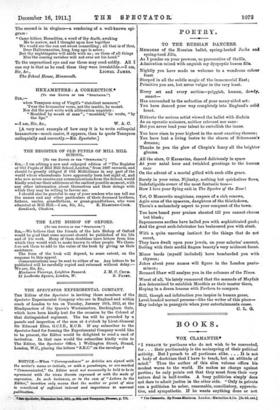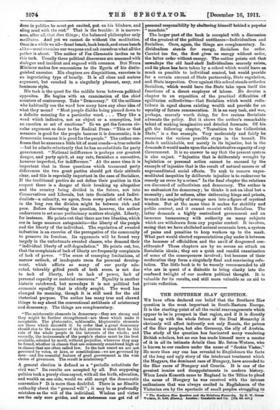BOOKS.
VOX CLAMANTIS., "I PREACH to partisans who do not wish to be converted, for . . . their partisanship is the mainspring of their political activity. But I preach to all partisans alike. . . . It is not a body of doctrines that I have to teach, but an attitude of mind." Thus the author of this slim volume offers his modest wares to the world. He makes no charge against parties ; he only points out that they must from their very nature deal in half-truths. A busy politician simply does not dare to admit justice in the other side. "Only in private can a politician be sober, reasonable, conciliatory, apprecia- tive, and sympathetic. If he wants anything done or not
• Pox Ciewmatis, By Num& Minimum. London Macmillan kCo. [38.6d. net.]
done in politics he must get exeibeda pufi on his blinkers, and sling mud with the rest." That is the trouble : it is narrow- ness, after all, that does things ; the balanced philosopher only meditates. And yet we cannot do without the meditation.
Once in a while we all—front bench, back bench, and cross bench alike—must examine our weapons and ask ourselves what all the pother is about. The author of Yes Clamantis invites us to this task Usually these political discourses are seasoned with dialogue and incident and sugared with romance. But Numa. Minimus makes few concessions to the Egeria, of his distin- guished ancestor. His chapters are disquisitions, exercises in an ingratiating type of homily. It is all close and serious argument, but eouched in a singularly pleasant, easy, and luminous style.
His task is the quest for the middle term between political opposites. He begins with an. examination of the chief counters of controversy. Take "Democracy." Of the millions who habitually use the word how many have any clear idea of what they mean? "Most people dislike being pinned down to a definite meaning for a particular word. . . . They like a word which indicates, not an object or a conception, but an emotion or set of emotions." So we get the famous cir- cular argument so dear to the Radical Press: "This or that measure is good for the people because it is democratic; it is democratic because it is good for the people." The author con- fesses that he annexes a little bit of most creeds—a. true eclectic —but he admits reluctantly that he has no substitute for party government. "National indifference is perhaps our greatest danger, and party spirit, at any rate, furnishes a corrective, however imperfect, for indifference." At the same time it is important that in those questions which transcend party differences the two great parties should get their attitude clear, and this is especially important in the ease of Socialism. If the traditional parties do not define their position in this respect there is a danger of their breaking tip altogether and the country being divided in the future, not into Conservatives and Liberals, but into Socialists and Indivi- dualists—a calamity, we agree, from every point of view, for in the long run the division might be between rich and poor. Before discussing the question, however, the author endeavours to set some preliminary matters straight. Liberty, for instance. He points out that there are two liberties, which are in large measure antagonistic—the liberty of the people and the liberty of the individuaL The regulation of sweated industries is an exercise of the prerogative of the community to preserve it freedom. Its opponents will be found very largely in the unfortunate sweated classes, who demand their "individual liberty of self-degradation." He points out, too, that the complaints of lack of liberty are frequently complaints of lack of power. "The sense of cramping limitations, of narrow outlook, of inadequate room for personal develop- ment, which afflicts so many of our partly edu- cated, tolerably gifted youth of both sexes, is not due to lack of liberty, but to lack of power, lack of personal capacity or material resources." Equality is another historic catchword, but nowadays it is not political but. economic equality that is chiefly sought. The word has changed its meaning, though it is still used for the old rhetorical purpose. The author has many true and shrewd things to say about the conventional antithesis of aristocracy and democracy. The things are complementary.
"The aristocratic elements in democracy—they are strong and they might be further strengthened—are those which make it acceptable. The plutocratic, ochlocratic, kleptocratie elements are those which discredit it. In order that a great democracy should rise to the measure of its full stature it must first be the rule of the whole people in the interests of the whole; and secondly, the instruments of the people's choice must be the best available, selected by merit, without prejudice, wherever they may be found, whether in classes that are commonly considered high or in classes that are often called low. In the last resort we are not governed by votes, or laws, or constitutions—we are governed by men—and the essential feature of good government is the wise choice of governors. The result is aristocracy."
A general election is defined as a "periodic substitute for
civil war." Its results are accepted by all. But supposing politics took a purely class aspect, with all the birth, education, and wealth on one side, would we still accept the democratic
convention ? It is more than doubtful. There is no Sinaitic authority about the "general will " ; it may be as profoundly mistaken as the will of the individual. Wisdom and virtue are the only sure guides, and no statesman can get rid of
personal responsibility by sheltering himself behind a popular "mandate."
The larger part of the book is occupied with a discussion of the greatest of the political antitheses—Individualism and Socialism. Once, again, the things are complementary. In- ' distidualisin stands for energy, Socialism for order. Carried too far, the first gives us energy without order, the latter order without energy. The author points out that nowadays the old hard-shell Individualism scarcely exists,. and its place has been. taken by a school which would leave as much as possible to individual control, but would provide for a certain amount of State partnership, State regulation, and State inspection. Over against this school stands orthodox Socialism, which would have the State take upon itself the functions of a. direct employer of labour. He devotes a chapter to an exposition of the practical difficulties cf egalitarian collectivism—that Socialism which would redis- tribute in equal shares existing wealth and provide for an equality of future remuneration. It is an easy task, and was, perhaps, scarcely worth doing, for few serious Socialists advocate the policy. But it shows the author's remarkable; talent of making imaginative and detailed forecasts. Of his gift the following chapter, "Transition to the Collectivist State," is a fine example. Very moderately and fairly he examines the various possible steps in the transit. He finds it unthinkable, not merely in its injustice, but in the demands it, would make upon the administrative capacity of any Government. It is no answer to say that the present system is also unjust. **Injustice that is deliberately wrought by legislation or personal action cannot be excused by the example of injustice that is the result of natural causes or of unpremeditated social effects. To seek to remove unpre- meditated inequities by deliberate injustice is to endeavour to remedy an error by a crime." In the finnl chapter the relations are discussed of collectivism and democracy. The author is no enthusiast for democracy ; he thinks it not an ideal but a necessity ; and he refuses, after dethroning kings and priests, to exalt the majority of average men into a figure of mystical wisdom. But at the same time it makes for stability and public content, and it cannot co-exist with Socialism. The latter demands a highly centralized government and an immense bureaucracy with authority on many subjects which are withdrawn from any popular control. It involves, seeing that we have abolished natural economic laws, a system of pains and penalties to keep workers up to the mark. What part would elected representatives play under it between the hammer of officialdom and the anvil of dragooned con- stituents? These chapters are by no means an attack on Socialistic ideals ; they are a quiet and candid examination of some of the consequences involved ; but because of their moderation they form a singularly final and convincing refu- tation. The little book is to be warmly recommended to all who are in. quest of a dialectic to bring clarity into the confused twilight of our modern political thought. It is valuable for its results, and still more valuable as an aid to private reflection.



















































 Previous page
Previous page